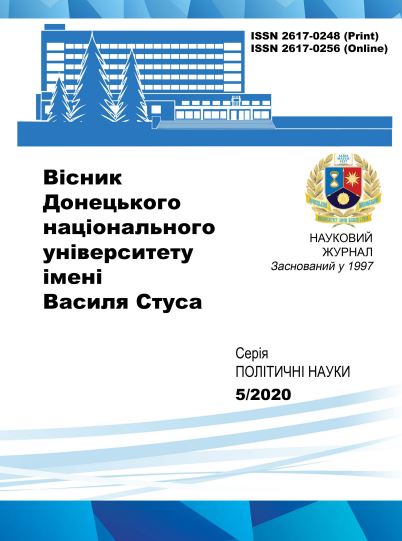Political folklore as a protest discourse of S.Yefremov (by the Diaries. 1923 – 1929)
DOI:
https://doi.org/10.31558/2617-0248.2020.5.2Keywords:
anecdotes; discourse; Yefremov; protest; diariesAbstract
Political folklore, as a reflection on political processes, has a pragmatic aspect in the form of political anecdotes. The formation of plots around which a verbal story is created indicates the degree of public attention to political phenomena, facts and political actors. Therefore, for the researcher of such texts, not only the anecdotes themselves are important, but also the topics around which the plot was built. As a tool of historical memory that can be used for political purposes, a political anecdote can emotionally complement or deny historical memory. Hence the emphasis on some historical events, and the lack of plots on other events indicates the translation of meaning, which has an intermittent frequency of codes. Recognized by a common cultural space, but in a public space, they are under the control of a government that has both blocking tools and its own dissemination mechanism. Hence, the researcher deals with both controlled and protesting political anecdotes.
The use of emotional images of "ours" and "others" through political anecdotes polarizes society, which can lead to both division and national unification. Therefore, it is important to study the reflection of changes and expectations, which are reflected through the discourse of everyday life on the example of political anecdotes.
The analysis of political anecdotes recorded in the "Diaries" of Ukrainian public person Serhiy Yefremov from 1923 to 1929 is conducted. The protest discourse of political anecdotes is emphasized, which both reflected the protest attitude to the political regime and created new unofficial political discourses. Through the study of certain forms, techniques, metaphors, laughter communication is studied and the dual structure of the "theory of liberation" at the personal and political levels is proved.
References
Виговський М. Ю. « Щоденники» академіка Сергія Єфремова: джерело вивчення номенклатури культурно-освітніх установ України 1920-х років. Пам'ять століть : Історичний науковий та літературний журнал. 2003. № 6. С. 81 –91.
Головецька Н. Український політичний анекдот на сторінках “Щоденників. 1923–1929” Сергія Єфремова. Народна творчість та етнографія. 2007. № 5. С. 23–27.
Денисенко Г., Денисенко О. Краєзнавчі нотатки Сергія Єфремова. Краєзнавство. 2000. № 1-2. С. 59–65.
Єфремов С.О. Щоденники, 1923 – 1929. К. : ЗАТ «Газета «РАДА», 1997. 848 с.
Калантаєвська Г., Сипченко І. А пресі… пресі теж смоленським шляхом іти доведеться (радянська періодика і видавнича справа у Щоденниках Сергія Єфремова) . Образ. 2017. №. 3. С. 94–105.
Масенко Л. Цінне джерело: нотатки мовознавця про «Щоденники» Сергія Єфремова. Урок Української. 2000. №1. С.20–23.
Нагорна Т. Щоденники С. Єфремова як джерело для вивчення особливостей суспільно-культурного та наукового життя в підрадянській Україні 1920-х років. Вісник Київського національного лінгвістичного університету. Серія Історія, економіка, філософія. 2012. №. 17. С.228–234.
Наєнко М. Сергій Єфремов і ранні модерністи. Слово і Час. 2012. № 1. С. 117–120.
Оляндер Л. Я й середовище в Щоденнику (1.01. 1895 – 4.02. 1896) Сергія Єфремова: проблема самопізнання, формування особистості та вибір життєвої позиції. Султанівські читання. 2015. №. 4. С. 71–80.
Фройд З. Дотеп та його стосунок до несвідомого. Пер. Я.М.Коган, М.В.Вульф. М. : АСТ, Мн. : Харвест, 2006. 480 с.
Чорнопиский М. Фольклорна політична сатира 20-х років ХХ століття у записах Сергія Єфремова : монографія. Львів : Видавничий центр ЛНУ ім. Івана Франка, 2001. 170 с.

